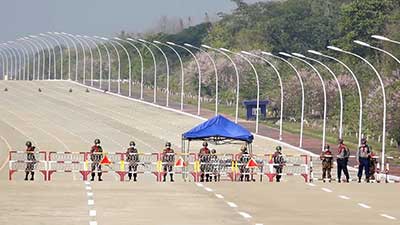Date: 02/02/2023
Relevance: GS-2: Bilateral, Regional and Global Groupings and Agreements involving India and/or affecting India’s interests.
Key Phrases: National Unity Government, Five-Point Consensus, ethnic armed groups, a military coup in Myanmar, Resolution 2669.
Why in News?
- The Myanmar military staged a coup in the country two years ago snatching power from the elected leaders.
- It derailed the limited democracy of the previous decade, violating the 2008 constitution which the generals had given to the people. The period since then has been a long nightmare for its people.
Internal Situation In Myanmar:
- Currently, there are three camps in Myanmar:
- The Military, which wields power in major towns;
- The National Unity Government (NUG) and its partners, which controls the situation in the countryside;
- The Ethnic groups on the geographic periphery, which are divided into those which are pro-military, pro-NUG, or neutral.
- Frequent Clashes in the country: Peaceful protests of the early post-coup months led to violent resistance along with frequent clashes occurring in many parts from the west to the east and the heartland.
- Widespread Insecurity: Insecurity is prevalent as a deep divide is seen in the air force bombing the citizens and the people’s militias killing government soldiers and policemen.
- Confinement of Aung San Suu Kyi: The Aung San Suu Kyi, whose party scored a decisive victory in the 2020 elections, presently serving a 33-year-long prison sentence in solitary confinement.
- Bypassing the Dialogue: The Military and the NUG have been blaming each other as “terrorists”, thus ruling out dialogue leaving little scope for reconciliation.
- Economic Challenges: Despite the above challenges, the sharp decline in GDP, a massive rise in poverty, unemployment, and inflation along with the free fall of currency pushes Myanmar into a total impasse today.
Global Response to the Myanmar crisis:
- Western Nations:
- They have condemned its actions at the United Nations with targeted sanctions against the military junta, and generous material assistance to the opposition.
- UN Security Council:
- The UN Security Council adopted Resolution 2669 calling for support for a ‘democratic transition’, a release of all political prisoners.
- It attracted no veto although abstentions were by China, Russia, and India only. Despite such a rare unity, the UN has failed to move the military, known for its stubbornness and inflexibility.
- ASEAN:
- Although ASEAN is interested in playing a mediator’s role in Myanmar, the government refuses to cooperate with ASEAN.
- In April 2021, Commander-in-Chief accepted ASEAN’s ‘Five-Point Consensus’ formula as a way out, but later he divulged it, refusing to make any concessions to the opposition.
- There are clear differences between the anti-military group (Indonesia, Malaysia, Singapore, the Philippines, and Brunei) and the pro-military group (Thailand, Vietnam, Laos, and Cambodia).
- A near-miracle was expected from the new chair, Indonesia. However, Jakarta realizes its limitations and believes that the problem lies within, which Myanmar’s political class itself will have to resolve.
- Russia and China:
- Both nations are trying to forge close cooperation with the government.
- China has extensive interests ranging from strategic to economic domains. It dislikes instability but has enough partners enabling it to keep consolidating its position.
- Russia, being neglected by the West due to the war in Ukraine has found a willing partner in Myanmar’s generals who need Russian arms, training, and political support.
- The more the West pressures the junta, the more closely the Myanmar military leaders embrace Beijing and Moscow.
The ASEAN five-point consensus
- An immediate cessation of violence in Myanmar.
- All parties shall exercise utmost restraint; constructive dialogue among all parties concerned shall commence seeking a peaceful solution in the interests of the people.
- A special envoy of the ASEAN Chair shall facilitate mediation of the dialogue process, with the assistance of the secretary-general of ASEAN.
- ASEAN shall provide humanitarian assistance through the AHA Centre (ASEAN Coordinating Centre for Humanitarian Assistance on disaster management), and
- The special envoy and delegation shall visit Myanmar to meet with all parties concerned.
India’s stand:
- India desires a stable and prosperous Myanmar where democracy flourishes but realpolitik comes in the way.
- New Delhi follows the policy of dealing with the government of the day. Thus, engaged in business with the generals, much to the NUG’s discomfiture.
India’s Interests in Myanmar:
- India has solid security and economic interests in Myanmar.It needs
assistance to:
- tackle the Indian Insurgent Groups sheltered in Myanmar
- its mega infrastructure projects aimed at the people’s welfare require the authorities’ cooperation.
- it is resolved to stay in competition with China for influence in Myanmar.
- India’s Myanmar experts are divided among themselves offering
contradictory advice.
- One group wants the Modi government to stay on the same course.
- The other advocates cooperation with NUG and the ethnic groups and play a mediator’s role.
- India knows that the root causes of the political problem lie on Myanmar’s soil. The responsibility for finding a solution, therefore, rests with its leadership.
Conclusion:
- The chances of holding free and fair elections in Myanmar seem rare given the opposition’s plans to disrupt them.
- Even if elections are held, they are unlikely to win credibility or legitimacy at home or abroad.
- The Burmese people tend to place their hopes on some miraculous assistance from the outside world.
Source: The Hindu
Mains Question:
Q. Discuss the political developments in Myanmar in the last two years. Should they be of any cause of concern to India? (150 words)







